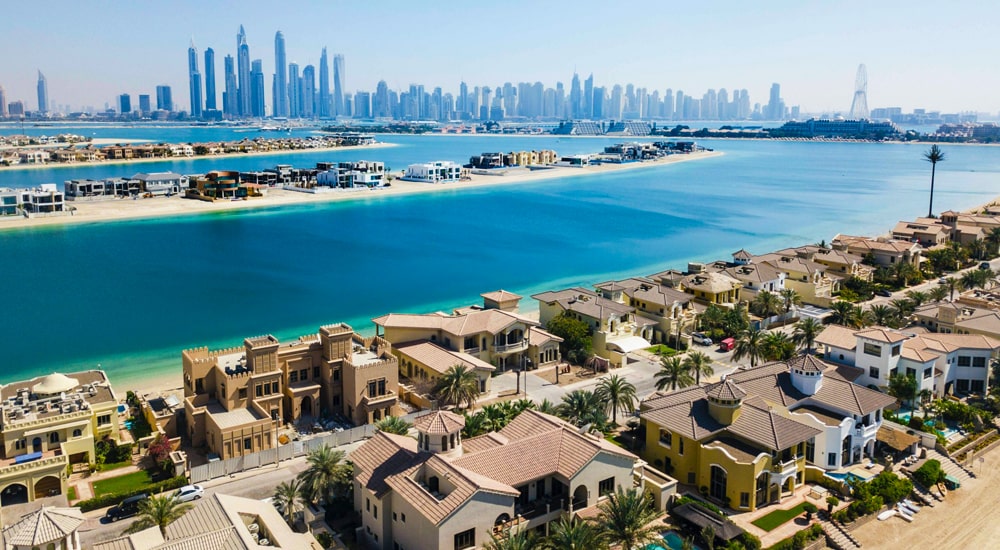
The Dubai real estate market is one of the most dynamic and rapidly evolving in the world. It offers a wide array of opportunities for investors, buyers, and renters. Below is a comprehensive guide to understanding and navigating the Dubai real estate market.
1. Overview of the Dubai Real Estate Market
- Growth and Development: Dubai has seen exponential growth in real estate since the early 2000s, transforming from a desert city to a global metropolis. Key areas like Downtown Dubai, Dubai Marina, and Palm Jumeirah are known for luxury developments.
- Market Trends: The market fluctuates with economic conditions, government policies, and global events. Currently, there is a trend towards more affordable housing, with a focus on mid-income segments.
2. Types of Properties Available
- Residential:
- Apartments: Available in various configurations, from studios to multi-bedroom units, commonly found in high-rise buildings.
- Villas: Ideal for families, offering larger living spaces, private gardens, and sometimes pools. Popular areas include Arabian Ranches and Emirates Hills.
- Townhouses: A hybrid between apartments and villas, offering more space than apartments but often more affordable than villas.
- Commercial:
- Offices: Located in business hubs like Business Bay and DIFC, ranging from small offices to large corporate spaces.
- Retail Spaces: Shops and commercial outlets available in malls and standalone buildings, catering to the retail sector.
- Industrial: Warehouses and factories primarily located in areas like Jebel Ali and Al Quoz.
- Land: Available for both residential and commercial development, with freehold and leasehold options.
3. Investment Opportunities
- Freehold Areas: Foreigners can buy property in designated freehold areas, such as Dubai Marina, Downtown Dubai, and Jumeirah Lake Towers (JLT).
- Off-Plan Projects: Buying properties that are under construction or yet to be built can offer significant discounts and capital appreciation potential.
- Rental Yields: Dubai offers some of the highest rental yields globally, especially in areas like Dubai Sports City and Jumeirah Village Circle (JVC).
4. Legal Framework and Regulations
- Ownership: Foreigners can own property in designated freehold areas, while leasehold areas allow ownership for a specified period (usually 99 years).
- Regulatory Authorities:
- Dubai Land Department (DLD): Responsible for all real estate transactions and enforcing regulations.
- Real Estate Regulatory Agency (RERA): Oversees real estate activities and protects investors and buyers.
- Visas: Property ownership above a certain value can qualify buyers for a residency visa, with recent reforms making it easier to obtain long-term visas.
5. Buying Process
- Research: Understand the market, choose the right location, and define your budget.
- Find a Property: Work with a reputable real estate agent to find a property that meets your needs.
- Legal Process: Sign a Memorandum of Understanding (MoU), pay a deposit, and proceed with the transfer at the DLD.
- Financing: Mortgages are available to both residents and non-residents, with banks offering up to 80% financing for residents and 50-75% for non-residents.
6. Challenges and Risks
- Market Fluctuations: The market can be volatile, with prices influenced by global economic conditions.
- Oversupply: A high number of new projects can lead to oversupply, affecting property values.
- Legal Risks: Ensure compliance with all regulations to avoid disputes or legal issues.
7. Tips for Investors
- Location: Prime locations often offer better long-term value and rental yields.
- Off-Plan Caution: While off-plan properties can be lucrative, they also come with risks like construction delays.
- Diversification: Consider spreading investments across different property types and areas to mitigate risks.
- Professional Advice: Work with experienced real estate agents and legal professionals to navigate the market effectively.
8. Future Outlook
- Sustainability: There is a growing focus on sustainable developments, with green buildings and eco-friendly practices becoming more prevalent.
- Expo 2020 Legacy: The event has left a lasting impact on infrastructure and real estate demand, particularly in areas like Dubai South.
- Digital Transformation: The real estate sector is embracing digital technologies, including virtual tours, blockchain for transactions, and smart home integrations.
Conclusion
The Dubai real estate market offers a wealth of opportunities, but it requires careful navigation. Whether you're looking to buy, invest, or rent, understanding the market dynamics, legal framework, and investment strategies is key to success. Working with experienced professionals and staying informed about market trends can help you make the most of your real estate ventures in Dubai.





